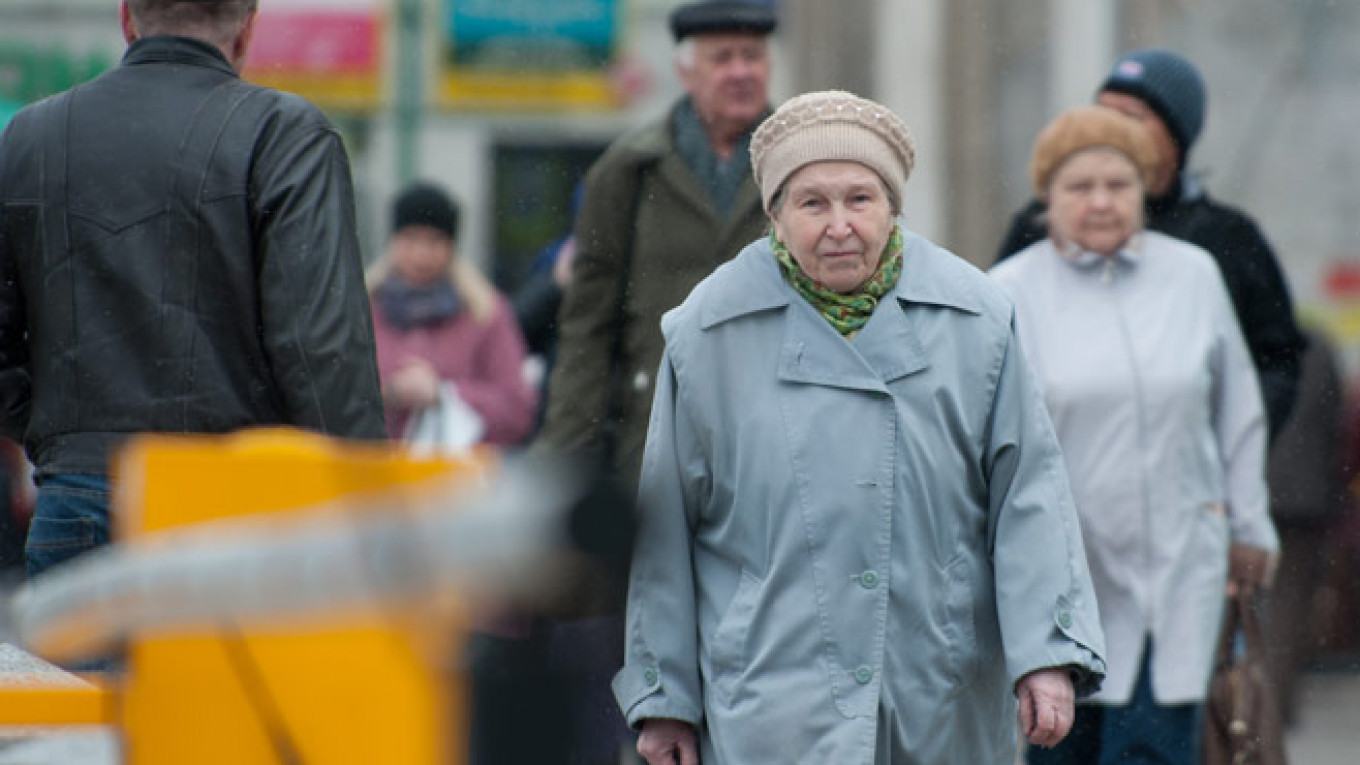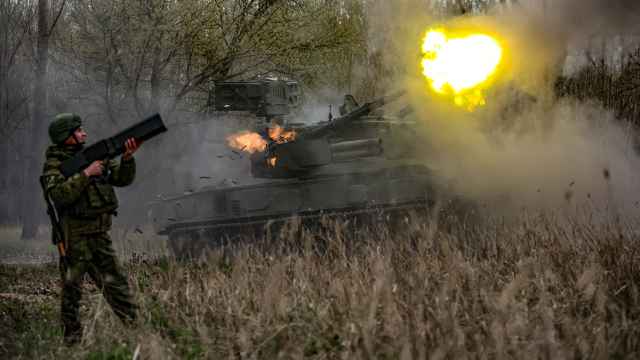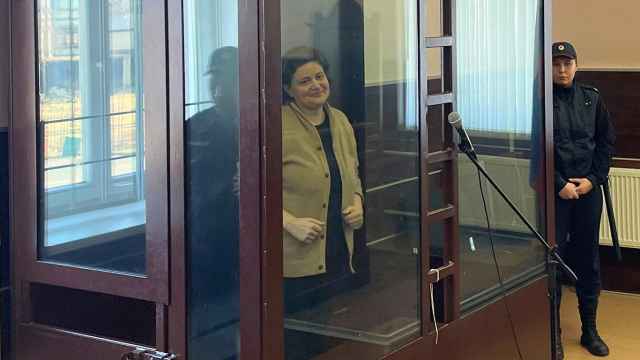Life expectancy in Russia has been growing several times slower than in the rest of the world for the past 20 years, according to a research by the U.S.-based Institute for Health Metrics and Evaluation released last week.
During the period of 1990-2013 it only grew by 1.8 years in Russia, while the global average number increased by 6.2 years, pushing Russia out of the top 100 countries with the highest life expectancy and placing it in 108th position — between Iraq and North Korea.
The situation will most likely worsen in the years to come, said experts. Economic crisis, lower incomes and deteriorating quality of life in the country will eventually have their impact on health and, therefore, overall life expectancy.
While some blame the weak health care system and Russians’ negligence toward their health and future, others claim there are a wide range of factors influencing these processes, and there is no simple explanation.
But whatever the reasons are, the demographic situation is already impacting the country’s economy, economists say, and vice versa, making it a vicious circle.
Objective Numbers
The research, published in The Lancet medical journal Wednesday, is optimistic about the future of the world’s population. “Global health is improving,” it concluded, summarizing the findings. The research was conducted on the basis of the Global Burden of Disease Study 2013, carried out by the World Health Organization. It covered life expectancy and health issues of 188 countries.
There were grounds for optimism — the global average life expectancy at birth grew by 6.2 years from 65.3 years in 1990 to 71.5 years in 2013. Global healthy life expectancy at birth, which represents the number of years people on average live without getting ill, also increased — by 5.4 years from 56.9 years in 1990 to 62.3 years in 2013.
But in Russia the numbers were much more humble. Its life expectancy in 1990 was actually higher than the global one — 69.4 years compared to 65.3 years. By 2013 Russian life expectancy had grown by 1.8 years and became 71.2 years, almost the same as the global one, which was 71.5 years due to a 6.2 years growth.
The trend remains the same when it comes to healthy life expectancy. In Russia it grew by 1.6 years — from 61.1 years in 1990 to 62.7 years in 2013, while the global indicator increased by 5.4 years — from 56.9 years in 1990 to 62.3 years in 2013.
There was a significant gap between the general life expectancy of Russian men and women and their healthy life expectancy. In 2013 men on average lived for 65.7 years, and only 58.9 years were spent in good health. Women lived for 76.7 years, and only 66.6 years were spent in good health.
No Simple Explanation
There is no simple explanation for these processes, said Vasily Vlasov, a professor at the Higher School of Economics’ Center for Health Care Policy who contributed to the study.
“[Life expectancy in Russia] started to decline at the beginning of the 1960s, and it has been, basically, doing so ever since. At the end of the 1980s it started to fluctuate — increasing and decreasing. The latest increase period lasted some eight years, until last year when it had its peak,” he added.
There are factors that influence life expectancy, said Vlasov, but it doesn’t mean that the changes can be easily explained by them. “Serious scientists don’t have a solid explanation for it. It is a mystery to some extent,” he added.
Nevertheless, a bad economy, according to him, was one of those factors — as well as the latest health care reform. “Expenses on health care are being seriously reduced,” and the government does not have the money to buy necessary medical equipment, which impacts on people’s health, Vlasov said. “It may contribute to the increase of the mortality rate. When people don’t have enough money, there is a whole bunch of reasons for the mortality rate to increase,” he added.
“Sometimes a lower quality of life pushes people to do things like stealing 200 meters of cable on the railroad — this could lead to a train crash and contribute to the mortality rate,” the professor added. “But when it comes to calculating life expectancy, there’s a whole lot more to it than these simple examples,” he said.
Heart disease is the number one cause of death in Russia, Vlasov pointed out, and it will be for many years to come. He named smoking as a huge risk factor related to heart illnesses, which often becomes a common bad habit during difficult economic conditions.
“When life gets harder, people become nervous and start to smoke, not thinking about its harmful influence on their health,” and smoking often leads to heart diseases, the expert said.
Question of Motivation
As surprising as it sounds, slow growth and the decline of life expectancy might be explained by the lack of motivation on the part of the elderly to live longer, said Olga Isupova, senior lecturer at the Higher School of Economics’ Institute for Demography.
It doesn’t mean a person wants to commit suicide, she said, but they care less about their health. “Especially men — when they get older, they simply don’t see a role for themselves in society. Once they quit their jobs and become pensioners, they don’t know what to do with their lives,” while women, at least, can enjoy being grandmothers, she told The Moscow Times in a phone interview.
In general, Russians are reckless about their health, and one of the related problems is drinking — people consume unhealthy amounts of alcohol, and that impacts their health heavily, explained Isupova.
In addition to that, Russians are not used to planning ahead and thinking about their future life, they prefer living in the here and now. “Life in Russia is unpredictable — and often people see no point in planning their future,” she said.
In general, the population of the country is getting older, but this is an objective trend all over the world, Isupova said, which means there are more old people. With the quality of health care deteriorating, being old in Russia is not an attractive proposition, she added.
It Gets Worse
The situation is likely to get worse, said both Vlasov and Isupova. “Either life expectancy growth will continue slowing down, or it will start to decline,” said Isupova.
“The mortality rate is increasing this year. No one knows yet how high it will get and for how long. I cautiously suggest that it is the beginning of another round of mortality rate growth,” said Vlasov.
Every demographic slump impacts the economy directly, and the impact can be seen already, explained Svetlana Gerasimova, director of the Center for Corporate and Social Responsibility of the MIRBIS Moscow International Higher Business School.
At the moment, universities accommodate fewer students than they are able. This is a result of the demographic pit of the 1990s, she told The Moscow Times in a phone interview. “It means there will be fewer people to fill the job vacancies, fewer people to work,” the economist said Friday.
“There will be also fewer women to have children, therefore their children will have fewer children, etc.,” Gerasimova added.
With those who were born some 70 years ago during the post-war baby boom era getting older and eventually dying and young women nowadays not in a rush to give birth, it appears that the country is looking into another demographic pit in the years to come.
Contact the author at d.litvinova@imedia.ru
A Message from The Moscow Times:
Dear readers,
We are facing unprecedented challenges. Russia's Prosecutor General's Office has designated The Moscow Times as an "undesirable" organization, criminalizing our work and putting our staff at risk of prosecution. This follows our earlier unjust labeling as a "foreign agent."
These actions are direct attempts to silence independent journalism in Russia. The authorities claim our work "discredits the decisions of the Russian leadership." We see things differently: we strive to provide accurate, unbiased reporting on Russia.
We, the journalists of The Moscow Times, refuse to be silenced. But to continue our work, we need your help.
Your support, no matter how small, makes a world of difference. If you can, please support us monthly starting from just $2. It's quick to set up, and every contribution makes a significant impact.
By supporting The Moscow Times, you're defending open, independent journalism in the face of repression. Thank you for standing with us.
Remind me later.






